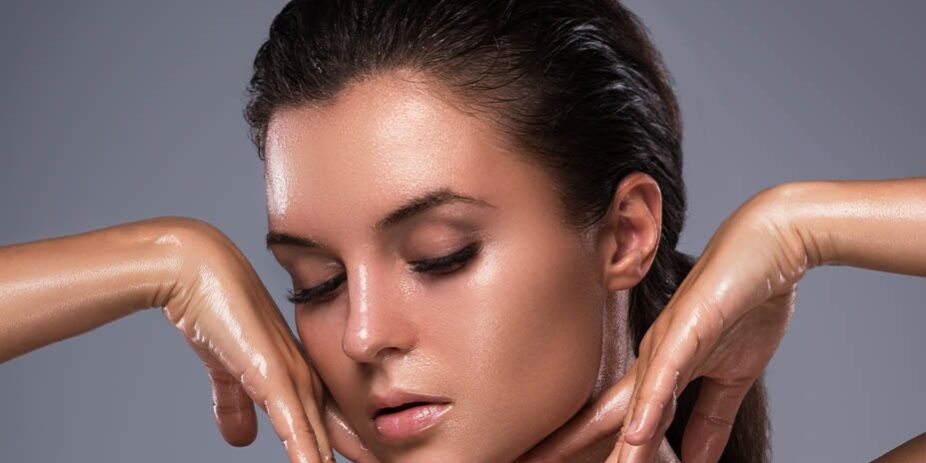Overly oily skin can make your face feel greasy and unkempt, particularly when it comes to your forehead.
The skin contains sebaceous glands which produce a natural oil called sebum. This oil helps protect your skin’s hydration by assisting with proper barrier function, but too much can be a bad thing. In addition to giving your skin a slick, shiny appearance, excess oil can clog your pores and prevent skincare products from absorbing properly.
What can you do about it?
While some people have naturally oily skin, excessive oil production is often a symptom of dehydration. When your skin becomes dehydrated, it produces more oil to compensate for the moisture loss.
Understanding why your skin becomes oily is the first step to getting rid of a shiny forehead. Here’s what you need to know.
What Causes Shiny Forehead?

If you don’t normally have oily skin, a shiny forehead might make you think you simply need to wash your face. While it’s true that surface oil accumulates over the course of the day, an extra cleanse might not be the ideal solution. In fact, it might contribute to the problem.
Unfortunately, excess sebum production is a complex issue, and it can often take a little time – and a little experimentation – to unveil the underlying cause.
Some people simply have more sebaceous glands than others and that means the skin might be oilier than those with normal, combination or dry skin types. The number of sebaceous glands you have is largely determined by genetics. People with fair skin tend to have more sebaceous glands than darker skin tones but, regardless of skin tone, these glands are most highly concentrated around the forehead, nose, chin, and mouth. This area is known as the “T-zone”. True oily skin has larger pores throughout the face, including the T-zone area.
While it’s normal for oil to accumulate in the T-zone a little more quickly than other areas of the face, there are numerous factors which can contribute to excess oil and shine.
Hormonal changes during pregnancy, adolescence, or menstruation are a major contributing factor in oil production. Anxiety and stress can affect your hormones as well, and therefore the condition of your skin. Certain medications might impact oil production as can exposure to environmental stressors. Even something as simple as sweating can contribute to oiliness.
Another common factor that contributes to oiliness is skin irritation. Over-exfoliating can strip the skin of its protective barrier that seals in moisture. Washing your face too often or neglecting your moisturizing routine could be part of the problem.
How to Rebalance Your Skin
No matter what causes your skin to become more oily than usual, hydration is going be to a key element in the resolution. Healthy skin requires plenty of moisture to maintain balance. When your skin lacks water, it produces more oil to compensate and that kicks off a cycle of slickness and shine.
Here are some simple tips for rebalancing oily skin:
- Don’t over-wash your face. Though it may be tempting, limit your face washing sessions to twice a day and be sure to use lukewarm rather than hot water. Make sure to use a good quality cleanser that is pH friendly to the skin and does not strip.
- Choose cleansers and moisturizers that contain ceramides to help restore the skin’s protective moisture barrier. Ceramides are a natural component of lipid oils, for example jojoba oil and sunflower oil.
- Apply toner after cleansing (while the skin is still damp) to provide a boost of added hydration and to help rebalance the skin.
- Select lightweight, mattifying moisturizers. A moisturizer that’s too dense or heavy won’t be absorbed properly and can sit on the surface, aggravating your already oily skin.
- Consider adding a facial oil to your routine. For shiny skin caused by dehydration, adding a facial oil to your routine could help restore the skin’s hydration by preventing water loss.
- Use a clay mask at least once a week to help purify the skin and absorb excess oil – alternatively, a moisturizing mask can help counter dehydration.
Even with a regular skincare routine of cleansing and moisturizing, you may not be able to completely eliminate shine. You may want to keep a travel-sized hydrating toner on hand to refresh your skin throughout the day or use blotting paper to absorb surface oil.



















